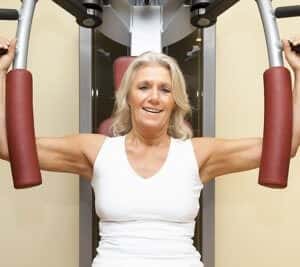
Weakened bones with low bone density put a person at risk for fracture. When an older person breaks a hip, the consequences can be devastating. As a result, it makes sense to look for ways to boost your bone density. Health care professionals often prescribe medications to improve bone density, but one reader had success with an entirely different approach.
How Can You Boost Your Bone Density?
Q. I have weak bones (osteopenia). I could not tolerate Actonel, Fosamax or Forteo.
Instead, I worked with a physical therapist on exercises to strengthen bones. I did mild weight-lifting exercises and resistance work with bands for two years.
After the next test, I got a phone call: “You have increased your bone density by 15 percent and it is now within normal limits.” I was flabbergasted. More people may want to try this approach instead of taking pills.
Which Drugs Will Boost Your Bone Density?
A. The first choice of most doctors in treating osteoporosis is often a bisphosphonate such as alendronate (Fosamax), ibandronate (Boniva) or risedronate (Actonel). These drugs slow down bone breakdown so that the bone-rebuilding cells can catch up. Despite their utility, these medications have some troublesome side effects, including serious inflammation of the esophagus.
Digestive Distress from Fosamax and Calcium:
Another reader wrote:
“I have been suffering terribly from constipation and heartburn. I am convinced that the calcium and Fosamax I take to build my bones are contributing to these problems. When I complain, my doctor just tells me to eat more fiber and take Metamucil. That makes me feel bloated and gives me gas.
“My neighbor says you have information on constipation and gas. Please send it since I am desperate.”
We responded that calcium and alendronate can both contribute to constipation. Fosamax may also cause heartburn, which can be a serious complication.
Managing Alendronate-Induced Constipation:
Besides fiber and fluids, some readers have found flax seed (found in Uncle Sam’s cereal or in a health food store) helpful against constipation and gas.
UniFiber (powdered cellulose) solved one woman’s constipation problem, while sugarless gum has helped others.
Denise commented on managing this problem:
“I was able to overcome a lifelong constipation problem and dependence on stimulant laxatives (Ex-Lax), and I think I could almost teach a class on it.
“The trick to prevent bloating with Metamucil is to start with a tiny amount – 1/4 tsp in a glass of water once per day, then twice per day, then three times per day, building up over the coarse of a week. Each week, increase the amount per serving by 1/4 tsp until you reach the dosage that works for you. For me it turned out to be 2 heaping tablespoons per day (one in the morning, one whenever convenient later in the day) of the sugar-free variety (the dosage is higher for regular Metamucil).
“It is extremely important to use a full, large glass of water – at least 8 oz – because the Metamucil will absorb whatever fluid is available. If insufficient liquid is provided, it will absorb whatever it can find, resulting in the opposite effect: constipation. If you are someone who doesn’t like water or Metamucil or just doesn’t drink much, do whatever you have to to get over it. At first I had to close my eyes and hold my nose while drinking it down. (I don’t know why this helped, but it did.)
“Don’t take it within 2 hrs before or after any meds or supplements because it can decrease their absorption. If this seems like a lot of bother, compare it to being severely, chronically constipated and it won’t seem so bad.
“But, for me, even Metamucil could not overcome the constipation caused by calcium supplements – until I read that a healthy calcium to magnesium intake ratio is about 2:1. As soon as I started taking 250 mg magnesium with every 500 mg calcium, normal bowel movements resumed.
“I really hope this helps because I’ve been there and it ain’t now fun.”
We have three guides that might be very helpful for these health concerns:
Graedons’ Guide to Constipation
Graedons’ Guide to Digestive Disorders
Graedons’ Guide to Osteoporosis
In addition, you may want to listen to our recent interview with Dr. Robynne Chutkan:
Other Side Effects of Alendronate and Other Bisphosphonates:
- • Stomach pain
• Swallowing difficulties
• Hoarseness
• Tarry stools
• Nausea
• Diarrhea
• Gas
• Bloating
• Headache
• Dizziness
• Rash
• Swelling of joints or extremities
• Bone pain or pain in hips or legs
Destruction of bone in the jaw (osteonecrosis) or in the hip are rare but very serious complications of these medications (Journal of Oral Maxillofacial Surgery, Aug. 2012). In addition, recent research suggests that bisphosphonates can impair macrophages, white blood cells that are important actors in the immune response (Oral Diseases, online June 5, 2018).
Boost Your Bone Density with Weight-Lifting:
People who cannot tolerate a bisphosphonate may need an alternate approach to deal with your bone problem.We are delighted to learn how well you have done with your exercise program. Others may benefit from your approach.
The time to put an exercise program lie yours into place is now. On the other hand, it may never be too late to start. One clinical trial that confirms the benefits you found offered people progressive weight lifting exercises following a hip fracture (Journal of the American Medical Directors Association, Jan. 2012). Those who participated in the exercises were less likely to die or be admitted to a nursing home during the two years of the study than those who received usual care.

